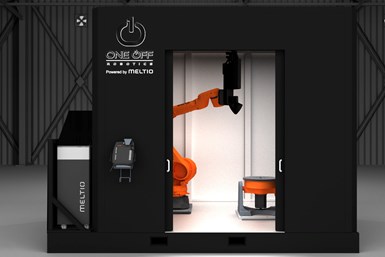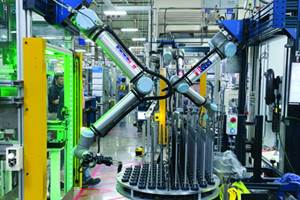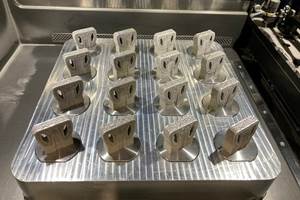Meltio, One Off Robotics Develop Robotic AM Work Cell for Cost-Effective, Reliable Metal Part Production
The system offers a deposition rate of up to 1 kg/hr to create clean parts that are fully dense and mechanically equivalent or superior to those created from traditional manufacturing.
The One Off Robotics Cell includes the robot, W-LMD system, two-axis positioner, Meltio machine vision laser alignment tool, welding camera and safety enclosure. Source: Meltio
One Off Robotics and Meltio have teamed up to develop the One Off Robotics Cell, a ready-to-use metal additive manufacturing (AM) robotic work cell designed for a faster, more efficient and reliable part production cycle. The companies say the new turnkey system can be quickly and easily deployed into any factory environment.
One Off Robotics is a U.S.-based company working as one of Meltio’s key partners in supporting wire-laser metal 3D printing in the U.S. The One Off Robotics Cell is a robotic metal AM system powered by Meltio’s Wire Laser Metal Deposition (W-LMD) technology. The system produces cost-effective, finely printed metal parts for applications in industries such as automotive, aerospace, mining, oil and gas, and others.
With a deposition rate of up to 1 kg/hr, this system excels at creating clean parts that are fully dense and mechanically equivalent or superior to those created from traditional means. The system seamlessly integrates control of the system, enabling users to easily adjust settings and print quickly. Its 8-axiskuka system simplifies complex geometry printing and is configured to work with the Meltio Space robotic slicer, as well as other robotic AM software.
The One Off Robotics Cell powered by Meltio uses standard welding wire and produces parts that are consistent, spatter-free and clean. The robot and positioner are installed on a self-supporting platform inside a custom, laser-safe enclosure, which ensures safe operation and quick installation.
The system package includes the robot, W-LMD system, two-axis positioner, Meltio machine vision laser alignment tool, welding camera and safety enclosure. Package add-ons are available for the thermal SWIR camera, multimaterial dual wire printing and hot wire printing for increased speed.
The system includes high-touch customer service and comprehensive support to assist end users in any industry. Meltio and One Off Robotics will also provide system training and instructional materials upon delivery to ensure technical support for end users in any industry.
Meltio says its main commitment with this robotic work cell is to offer all types of industries the ability to manage the entire manufacturing process using its metal 3D printing technology — which consists of a Meltio meltiokukhead integrated into a robotic arm and a safe environment — to just produce parts. “This new hardware system allows the customer to receive a ready-to-use cell for robotic metal 3D printing, removing the integration process and long assembly lead times,” says Alejandro Nieto, Meltio engine product manager.
One Off Robotics says it has spent years designing and building a large-format robotic AM work cell. “We’re thrilled to expand our offerings to include a turnkey Meltio robotic additive system,” says Nick Johnson, One Off Robotics CEO. “Our focus is customer success, so we designed this system from the ground up to be quickly installed and easily operated.”
The One Off Robotics Cell is an evolution of Meltio’s standard Engine Robot Integration and is also certified to operate with KUKA and ABB robotic arms. The new system serves as an advanced, yet user-friendly system designed to empower industries across the world to incorporate Meltio’s metal AM technology.
Related Content
Combining Metal and Polymer for Better 3D Printed Tools
Applications prone to wear call for more durable tooling than 3D printed polymer alone, but full metal is not always necessary.
Read MoreHow AM Enables Cobot Automation for Thyssenkrupp Bilstein (Includes Video)
The shock absorber maker has responded to its staffing shortages through extensive use of collaborative robots. In-house 3D printing makes this possible by providing the related hardware needed to complete the cobot-automated cells.
Read MoreDMG MORI: Build Plate “Pucks” Cut Postprocessing Time by 80%
For spinal implants and other small 3D printed parts made through laser powder bed fusion, separate clampable units resting within the build plate provide for easy transfer to a CNC lathe.
Read MoreCopper, New Metal Printing Processes, Upgrades Based on Software and More from Formnext 2023: AM Radio #46
Formnext 2023 showed that additive manufacturing may be maturing, but it is certainly not stagnant. In this episode, we dive into observations around technology enhancements, new processes and materials, robots, sustainability and more trends from the show.
Read MoreRead Next
Alquist 3D Looks Toward a Carbon-Sequestering Future with 3D Printed Infrastructure
The Colorado startup aims to reduce the carbon footprint of new buildings, homes and city infrastructure with robotic 3D printing and a specialized geopolymer material.
Read MoreProfilometry-Based Indentation Plastometry (PIP) as an Alternative to Standard Tensile Testing
UK-based Plastometrex offers a benchtop testing device utilizing PIP to quickly and easily analyze the yield strength, tensile strength and uniform elongation of samples and even printed parts. The solution is particularly useful for additive manufacturing.
Read More3D Printed Polymer EOAT Increases Safety of Cobots
Contract manufacturer Anubis 3D applies polymer 3D printing processes to manufacture cobot tooling that is lightweight, smooth and safer for human interaction.
Read More





















